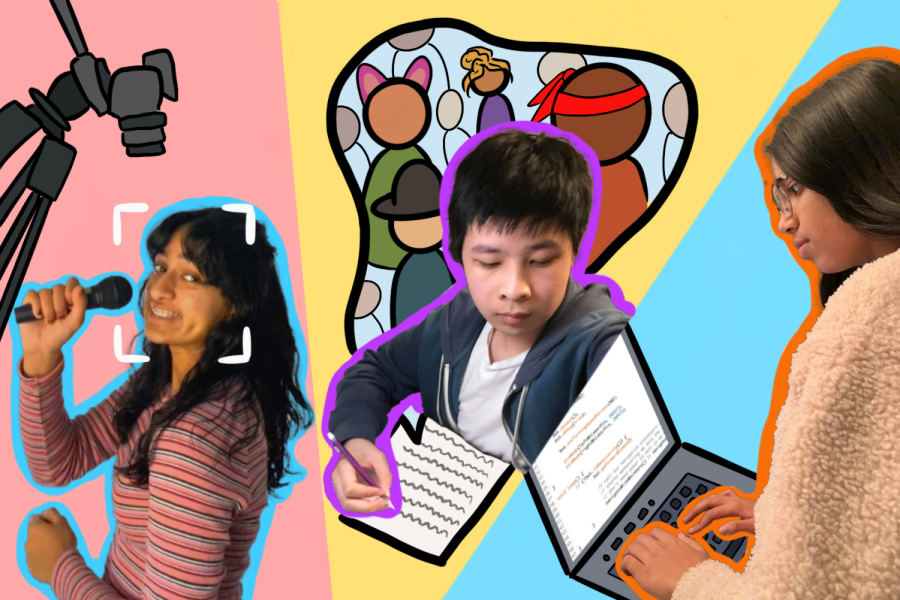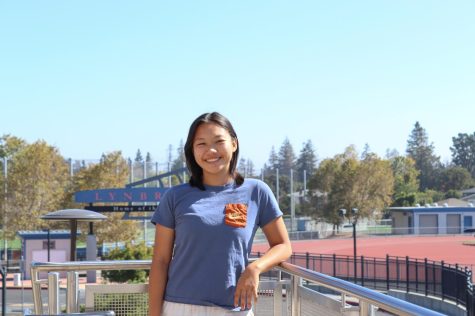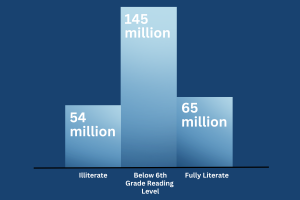Channels, circuits and characters: Students discover new passions in quarantine
Graphic illustration by Elizabeth Cheng
Quarantine has given (from left to right) Vakkalanka, Chen and Sriram ample time to pursue new hobbies, which have helped them foster new skills and improve themselves as people.
November 4, 2020
With extracurricular activities put on pause at the beginning of the pandemic, students have been inspired to explore many new hobbies that have allowed for self-improvement. Although many canceled activities have begun to resume, some students are still making time for the hobbies they started earlier in quarantine, finding them to be a source of relaxation and stability.
SRAVYA VAKKALANKA:
Since she was young, sophomore Sravya Vakkalanka has been passionate about singing, having taken Indian classical singing lessons for over a decade. Vakkalanka joined Mixed Choir during her freshman year and now sings in Dolcissima, Lynbrook’s audition-only girls’ choir.
“The nice thing about taking many styles of music is that you can learn different techniques,” Vakkalanka said. “In Indian classical singing, you focus more on chest voice and runs, but in choir, you focus more on head voice and vibrato. Since I do both, when I post covers on YouTube, [I can] mix what I know into [my videos].”
Vakkalanka has always experimented with songs in her free time, but the pandemic has given her the time needed to record, film and edit covers of songs to post on her YouTube channel, “sravya !!” She began to post music online in October 2019 when she created a shared singing account on Instagram with sophomore Sanika Mithbaokar, where they posted covers harmonizing together.
However, after the first shelter-in-place order in March, health safety restrictions made filming the covers increasingly difficult because Mithobaokar and Vakkalanka’s parts had to be filmed separately then edited together. The pair also struggled to find time to work together on adding new parts to songs. As a result, the account was transformed into Vakkalanka’s personal singing account, where she now posts her favorite one-minute clips from her covers to promote her YouTube channel.
Vakkalanka started her YouTube channel after experimenting with GarageBand and Adobe Premiere Pro and spent hours watching tutorials on how to use different editing and audio softwares.
YouTube, a video platform, allowed Vakkalanka to post long covers and gave her the freedom to add different layers of sound, such as the piano, guitar or ukulele. Vakkalanka also feels that it is easy to grow an account on the platform.
To create her covers, Vakkalanka first explores the instrumentals of her favorite songs by searching them up online and then builds off the chords of the instrument she’s decided to use to create the main and harmonizing tracks.
“I add different layers where the main track sounds kind of empty, because I’m using my own instrumental tracks and not karaoke tracks which usually have instruments to make parts like the chorus louder and more energetic,” Vakkalanka said.
Vakkalanka, who is usually shy when it comes to singing in front of others, has become more confident after posting her music on social media. She has received overwhelmingly positive feedback from her audience, which consists of her friends, mutual friends and a few individuals she does not know.
“After I started the two accounts [on Instagram and Youtube], I’ve been able to sing in front of people in person,” Vakkalanka said.
In addition to posting covers of her current favorite songs on her Youtube channel, Vakkalanka hopes to post several original songs she has been creating in the near future.
MALAIKA SRIRAM:
Junior Malaika Sriram became interested in electronics after Physics Honors introduced her to direct current circuits in her sophomore year. She was never too fond of computer science but decided to play around with Arduino Uno, an open-source microcontroller board developed by the company Arduino, because of how it combined circuits with coding.
Sriram’s father had bought an Arduino Uno kit that lay untouched for a few years, so Sriram decided to tinker around with it in quarantine to alleviate her boredom.
During remote learning, Sriram found sufficient time to work on her Arduino projects nearly every other day. However, this school year, Sriram usually works on her projects over the weekends due to a heavier workload.
“[Coding with Arduino] makes me feel more secure because it’s always something that I can turn to,” Sriram said.
Still a beginner, Sriram follows instructions that come with the Arduino Uno kit. The code, written in C++, is compiled on her computer, which is connected via a USB plug to a breadboard, which is then connected to the Arduino Uno board.
Sriram started by creating very simple projects, such as parallel circuits that light up LED lights one by one. To do this, she wrote a function for each light and called the function through a loop, which allowed the lights to brighten in an orderly fashion.
Her favorite project so far has been a locking mechanism for boxes in which a Piazza, an electrical component, is attached to a breadboard and the Arduino Uno. The Piazza, which can detect vibrations, is pressed against a surface so the Arduino Uno can identify the intensity of the force. The Piazza measures the strength of a knock on the box, which will unlock if the knock is the proper intensity.
Sriram finds debugging her code to fix problems to be the most frustrating aspect of the circuit-building process, but the end result is satisfying and relieving.
“Once, I didn’t check to make sure that the Arduino was connected to my computer,” Sriram said. “I was freaking out because it wasn’t working at all, but I finally found out that I didn’t plug it into [the computer] right.”
Sriram wants to encourage other students to try new hobbies, especially if they have the time. It could lead to the discovery of a new passion, similarly to how Sriram found that she enjoyed coding and building circuits with Arduino.
“The worst that could happen is that you just might not be interested in it,” Sriram said. “Even the worst case is not bad at all, because at least you tried something new!”
ALEC CHEN:
With his usual activities like orchestra and Science Olympiad canceled, senior Alec Chen found himself stuck at home and left with a lot of free time at the beginning of remote learning. He decided to spend more time on creative writing, a hobby that he previously only dabbled with during the weekends.
Chen was able to improve his own writing, especially character development, by pulling from more experienced writers’ work, noting what traits their characters had and how they interacted with their respective situations. He also spent time studying various story forms, whether it was novels, movies or video games. Chen paid attention to how characters were formed and how they evolved so that he could emulate the techniques in these stories.
“My first few characters were pretty basic and very one-sided,” Chen said. “I don’t consider them to be very well-developed. Eventually, with a few years’ progress and especially quarantine, my writing skills got much better and I was able to create more complex characters and more interesting stories.”
He took inspiration from several video games, including the Persona 5 series, a role-playing video game by Atlus, and Fire Emblem by Nintendo.
“[In Fire Emblem], when the supporting characters talk to each other, it’s actually super intriguing,” Chen said. “The side conversations the characters add complexity. You get to know them better, and it turns them into well-written people that actually seem human.”
Chen’s favorite aspect of writing is the creativity component, especially building plot lines and character arcs, and he enjoys allowing his characters to interact with other people’s characters in different settings.
Chen is in a few small Discord servers with his friends and mutual friends, where they meet to write together for around an hour at a time. One person establishes a storyline and characters to go along with it, then the others put their own characters into the plot to see how they interact with those around them and react to setbacks.
“I want to create interesting characters, but I don’t want to make them like a ‘Mary Sue’,” Chen said. “In character development terms, that’s like a super flawless character who doesn’t have any faults, and it’s a terrible thing to have.”
The story usually consists of the characters trying to stop an overarching evil force and interacting with the fantasy world around them. At times, Chen and his friends pursue a short side story to develop their own characters. When doing this, Chen envisions himself as the character and thinks from his or her point of view, which he feels has made him more thoughtful in daily life.
“[It has] influenced me to think from other people’s perspectives,” Chen said. “If someone [tells me] I did something wrong, I try to think about what I did to make them upset and how I can fix [the situation] or how I can fix myself.”
When creating characters, especially those who are intelligent, Chen has to make sure that they always think one step ahead and take into account how other characters are going to react. This has helped Chen become more aware of his own behavior.
“Now, I always have to check any rash things I do,” Chen said. “I feel like I’ve been a little more thoughtful about my actions and how they affect my surroundings.”
Although Chen does not plan on pursuing writing in college, he feels that he’s learned a lot and developed as a person as a result of the hobby, which will help him no matter what he studies in the future.




























































